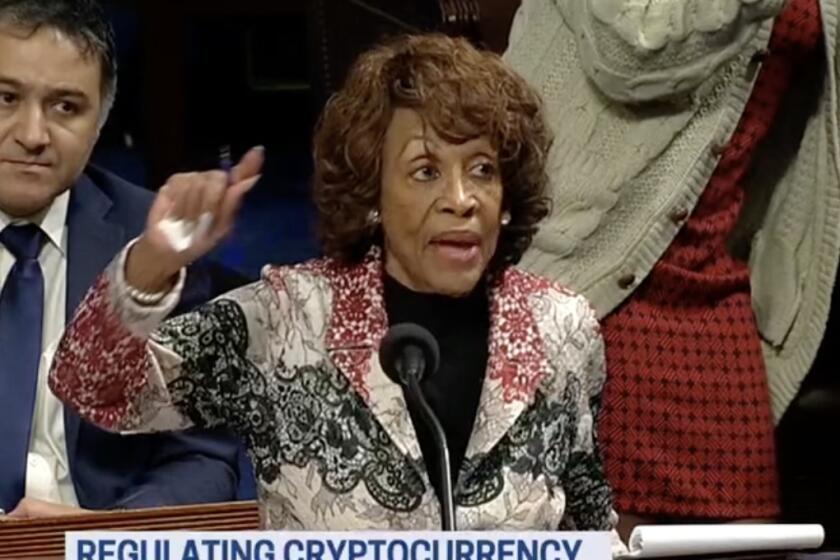Regulation
Con il consenso democratico, la Camera vota per aprire delle lacune nella regolamentazione delle criptovalute

La deputata Maxine Waters (D-Los Angeles) ha provato mercoledì a spiegare ai suoi colleghi della Camera perché la riduzione delle normative sulle criptovalute danneggerà investitori e consumatori. (C-SPAN)
Il denaro, come tutti sappiamo, è il latte materno della politica in America. Può sembrare ancora più nutriente se puoi produrlo tu stesso.
Questo è sicuramente ciò che spiega la sollecitudine che l’industria delle criptovalute ha ricevuto dal Congresso.
Mercoledì la Camera ha approvato un disegno di legge che riduce la regolamentazione delle criptovalute, nonostante ampie prove del fatto che questa classe di asset sia stata un paradiso per truffatori, estorsori e peggio.
La legge “renderà gli Stati Uniti più sicuri per i trafficanti di droga, per i finanziatori del terrorismo, per i trafficanti di bambini e di droga e per coloro che acquistano e vendono materiale pedopornografico”, ha affermato il deputato Sean Casten (D-Ill.), elencando alcuni dei casi documentati. utenti di criptovalute negli ultimi anni. “Non sapevo che questi gruppi avessero sostenitori così orgogliosi al Congresso.”
Il record di fallimenti, frodi e fallimenti del settore delle criptovalute non è dovuto alla mancanza di regole o al fatto che le regole non siano chiare. È perché molti attori nel settore delle criptovalute non rispettano le regole.
Il presidente della SEC Gary Gensler
Casten potrebbe trovarsi nella minoranza della Camera in più di un modo. I promotori delle criptovalute sono riusciti a allontanare diversi democratici alla Camera e al Senato dalla forte opposizione del partito alla riduzione delle normative sulla classe di attività.
All’inizio di questo mese, le maggioranze bipartisan in entrambe le camere hanno votato per annullare una linea guida della Securities and Exchange Commission vecchia di 2 anni su come gli istituti finanziari dovrebbero tenere conto delle risorse crittografiche lasciate loro in custodia dai clienti. Il presidente Biden ha detto che lo avrebbe fatto porre il veto al cambiamentoe le maggioranze in nessuna delle due camere erano abbastanza ampie da annullare un veto.
Il caucus congressuale delle criptovalute ha regalato al settore un’altra vittoria mercoledì, quando la Camera è passata la legge sull’innovazione e la tecnologia finanziaria per il 21° secolo, noto come FIT21. Il voto è stato di 279 a 136, con 71 democratici che si sono uniti alla maggioranza repubblicana.
Il destino del provvedimento è incerto al Senato, che non l’ha ancora accolto. Biden lo ha fatto ha dichiarato la sua opposizione a FIT21 ma non ha promesso un veto, cosa che il gruppo cripto e i suoi sostenitori sembrano considerare una grande vittoria. Biden ha affermato di essere disposto a negoziare un sistema normativo che protegga i consumatori e gli investitori di criptovalute senza interferire indebitamente con l’innovazione, ma “sarà necessario ulteriore tempo”.
Se diventasse legge, FIT21 esaudirebbe il desiderio più sentito dei promotori di criptovalute: rimuoverli dalla giurisdizione della potente SEC e trasferire la supervisione alla Commodity Futures Trading Commission, cronicamente sottofinanziata e con personale insufficiente.
La storia continua
Il loro obiettivo è comprensibile, dal momento che la SEC è stata esplicita riguardo alla sua intenzione di regolamentare le criptovalute come titoli, sottoponendo l’asset class alle regole di divulgazione e alle tutele contro le frodi che hanno reso i mercati finanziari tradizionali negli Stati Uniti i più sicuri al mondo.
Per saperne di più: Colonna: Il sistema legale si sta avvicinando alle criptovalute e le cose potrebbero solo peggiorare
Durante il dibattito in aula di mercoledì, i sostenitori del disegno di legge hanno parlato delle virtù di liberare una tecnologia innovativa da “regolatori troppo zelanti” – si trattava della deputata Cathy McMorris Rodgers (R-Wash.), pronunciando parole che avrebbero potuto essere dettate dai dirigenti delle criptovalute – e sollevandoli dall'”incertezza normativa”.
Il presidente della SEC Gary Gensler ha messo da parte quest’ultima affermazione una dichiarazione su FIT21 ha pubblicato mercoledì poche ore prima del voto. “Il record di fallimenti, frodi e fallimenti del settore delle criptovalute non è dovuto alla mancanza di regole o al fatto che le regole non siano chiare”, ha affermato. “È perché molti attori del settore delle criptovalute non rispettano le regole.”
I sostenitori del disegno di legge hanno cercato di enfatizzare l’importanza delle criptovalute come asset finanziario affermando che il 20% degli americani sono proprietari di criptovalute. Non ci sono prove per questo. Al contrario, la Federal Reserve ha scoperto che l’interesse per le criptovalute tra gli americani comuni è debole e sta svanendo.
Nel suo indagine più recente sulla condizione economica delle famiglie statunitensi, pubblicato questo mese, la Fed ha stabilito che solo il 7% degli americani ha acquistato o detenuto criptovalute come investimento (in calo rispetto all’11% nel 2021) e solo l’1% le ha utilizzate per acquistare qualsiasi cosa o effettuare un pagamento. Ciò sottolinea la verità più importante sulle criptovalute, anche se i suoi promotori raramente riconoscono: nessuno ha ancora identificato uno scopo autentico per le criptovalute nel mondo reale.
“Le entità che trarranno vantaggio da questo disegno di legge non sono investitori ordinari che cercano di creare ricchezza”, ha detto mercoledì dall’aula della Camera la deputata Maxine Waters (D-Los Angeles), il democratico in carica nel Comitato per i servizi finanziari della Camera, “ma piuttosto le aziende crittografiche. … Hanno già guadagnato miliardi di dollari emettendo o agevolando illegalmente l’acquisto e la vendita di titoli crittografici.”
Waters ha descritto accuratamente l’effetto di FIT21 come l’inserimento effettivo delle criptovalute in una “terra di nessuno” normativa. Ha descritto il disegno di legge come “un approccio libertario MAGA estremo, in cui le aziende possono operare senza controllo normativo e i consumatori e gli investitori possono individuare ed evitare schemi fraudolenti da soli”.
Ciò che più colpisce della spinta per FIT21 è che arriva così a ridosso dei grandi scandali nel settore delle criptovalute. Sam Bankman-Fried, il fondatore della società di criptovaluta FTX, è stato condannato a marzo a 25 anni di carcere per frode crittografica, dopo essere stato condannato a novembre per sette capi d’accusa federali relativi alla frode.
Per saperne di più: Colonna: La truffa crittografica è in supporto vitale. Perché alcuni legislatori stanno cercando di dargli la RCP?
Durante il periodo di massimo splendore di FTX, Bankman-Fried è comparso davanti ai comitati del Congresso per promuovere uno schema normativo su misura per le criptovalute che somigliasse molto a quello incorporato in FIT21.
Proprio il mese scorso, Changpeng Zhao, fondatore della società internazionale di criptovalute Binance, lo è stato condannato a quattro mesi di carcere sulle accuse federali di riciclaggio di denaro; Zhao aveva precedentemente accettato di pagare una multa di 50 milioni di dollari, e Binance ha risolto il caso del governo contro di lui per 4,3 miliardi di dollari.
La SEC sta portando avanti una causa contro l’exchange di criptovalute Coinbase per la vendita di titoli non registrati. A marzo, il giudice federale Katherine Polk Failla ha negato la mozione dell’azienda di annullare il caso. Il suo ragionamento spiega efficacemente perché FIT21 non solo non è necessario, ma dannoso: “La nomenclatura ‘cripto’ potrebbe essere di epoca recente”, ha scritto, “ma le transazioni contestate rientrano comodamente nel quadro che i tribunali hanno utilizzato per identificare i titoli per quasi ottanta anni.”
Il contrappeso alle argomentazioni contro FIT21 è il contante: la varietà verde, non quella figurativa commercializzata dalle società di criptovaluta. Tre super PAC formati da dirigenti e investitori del settore cripto hanno raccolto circa 85 milioni di dollari da spendere nelle gare politiche del 2024.
La potenza finanziaria delle spese elettorali di questo settore non è in discussione. Uno dei PAC, Fairshake, ha speso più di 10 milioni di dollari nell’ultimo anno in opposizione alla deputata Katie Porter (D-Irvine) nella sua corsa per la nomina democratica al Senato degli Stati Uniti.
Porter era conosciuto come un forte critico delle criptovalute. Nel 2022 si è unita alla senatrice Elizabeth Warren (D-Mass.), la critica crittografica più rumorosa di Capitol Hill, in un’indagine su come il “mining” di criptovalute tramite computer avesse influenzato la rete energetica in Texas e l’aumento dei prezzi dell’energia per i consumatori.
Porter ha perso la corsa al Senato. Il suo avversario vittorioso alle primarie, il deputato Adam B. Schiff, ha assunto una posizione molto più indulgente nei confronti delle criptovalute, elencandole sul sito web della sua campagna tra le “nuovi sviluppi tecnologici… dobbiamo crescere” al fine di mantenere i posti di lavoro e la supervisione normativa nelle mani degli Stati Uniti.
Nell’attuale ciclo elettorale del Congresso, Fairshake ha donato 702.300 dollari alle campagne democratiche e 551.700 dollari ai repubblicani. Il suo più grande destinatario è il rappresentante Patrick McHenry (RN.C.), presidente del Comitato per i servizi finanziari della Camera e sponsor di FIT21. La sua campagna ha ricevuto 126.626 dollari anche se ha annunciato che non si candiderà alla rielezione quest’anno e che si ritirerà dal Congresso.
Nella sua dichiarazione, Gensler ha cercato di rafforzare la comprensione dei legislatori sui rischi che sostengono con questa misura. Il disegno di legge “creerebbe nuove lacune normative e minerebbe decenni di precedenti” nella regolamentazione dei contratti di investimento, ha scritto, “mettendo gli investitori e i mercati dei capitali a un rischio incommensurabile”.
Per saperne di più: Articolo: I sette verdetti di colpevolezza di Sam Bankman-Fried smascherano le criptovalute come una vera e propria truffa
Ciò consentirebbe ai promotori di criptovalute di “autocertificare” che i loro prodotti non rientrano nelle normative tradizionali e concederebbe alla SEC solo 60 giorni per rispondere. Rimuovendo le piattaforme di trading di criptovalute dalla struttura normativa che sovrintende agli scambi azionari e obbligazionari, si aprirebbe la porta a conflitti di interessi riducendo la protezione dei consumatori contro le piattaforme che mescolano i loro fondi con quelli dei clienti.
Il disegno di legge esenta inoltre i promotori di criptovalute dalle regole che richiedono che gli investimenti rischiosi siano offerti solo a investitori accreditati—quelli con un patrimonio netto superiore a 1 milione di dollari, senza contare la residenza principale, o un reddito superiore a 200.000 dollari (per le coppie, 300.000 dollari) in ciascuno dei due anni precedenti.
Il cinico dispositivo utilizzato da FIT21 per neutralizzare la supervisione della SEC sugli investimenti in criptovalute è quello di affidare questo compito alla CFTC. Come osserva l’organismo di vigilanza Better Markets, la CFTC ha un budget di soli 365 milioni di dollari, contro i 2,1 miliardi di dollari della SEC, e meno di 700 dipendenti, rispetto ai circa 4.500 dipendenti della SEC.
Il disegno di legge “accumulerebbe una serie completamente nuova di responsabilità sulla CFTC, rendendola il regolatore de facto di innumerevoli nuovi scambi di criptovalute e broker-dealer”, ha scritto Better Markets, anche se la CFTC “non ha i fondi per soddisfare tutti i suoi impegni”. attuali mandati statutari.”
Il dibattito di mercoledì che ha preceduto l’approvazione alla Camera del FIT21 è stato tipicamente stonato e pieno di affermazioni fittizie e fittizie. Il deputato Mike Flood (R-Neb.) ha invocato lo scandalo FTX, che ha visto miliardi di dollari in depositi crittografici di clienti e investitori stanziati illegalmente dai leader dell’azienda. “Dobbiamo garantire che ci siano norme di protezione che impediscano che qualcosa del genere accada di nuovo”, ha affermato.
Flood ha affermato che, secondo FIT21, a FTX sarebbe stato impedito di registrarsi come borsa di scambio e non sarebbe stata in grado di mescolare i suoi fondi con quelli dei suoi clienti. Viene da chiedersi di cosa stesse parlando. A FTX è stato impedito di registrarsi come exchange e non lo ha fatto. Perché? Perché Bankman-Fried, il suo fondatore, sapeva che così facendo avrebbe sottoposto l’azienda alla supervisione della SEC, a cui nessuno nel mondo delle criptovalute vuole sottoporsi.
Per quanto riguarda la commistione di fondi, è già illegale: è una delle pratiche che hanno portato Bankman-Fried in prigione.
La conclusione è molto chiara. Non c’è alcuna giustificazione per conferire alle criptovalute uno schema normativo tutto suo. I suoi promotori non hanno altro argomento se non quello di affermare che hanno bisogno di una regolamentazione leggera per promuovere l’”innovazione”, quando il risultato sarà quello di facilitare l’imbroglio dei clienti, il riciclaggio di denaro o lubrificare attacchi ransomware come quello che ha ha interrotto le operazioni cruciali della controllata Change Healthcare del gruppo UnitedHealthche gestisce i processi di rimborso per i fornitori di servizi sanitari a livello nazionale.
Se c’è un angolo del mondo finanziario che richiede una regolamentazione più severa, è proprio quello delle criptovalute. Per il Congresso anche solo contemplare un allentamento della regolamentazione già esistente è a dir poco assurdo. Ma il Congresso non risponde agli aspetti pratici; risponde al denaro. Questo è l’unico motore di iniziative come FIT21.
Ricevi le ultime novità da Michael Hiltzik
Commento sull’economia e altro da un vincitore del Premio Pulitzer.
Iscrivimi.
Questa storia è apparsa originariamente in Los Angeles Times.
Regulation
Cryptocurrency Regulation in Slovenia 2024

Slovenia, a small but highly developed European country with a population of 2.1 million, boasts a rich industrial history that has contributed significantly to its robust economy. As the most economically developed Slavic nation, Slovenia has grown steadily since adopting the euro in 2007. Its openness to innovation has been a key factor in its success in the industrial sector, making it a favorite destination for cryptocurrency enthusiasts. Many believe that Slovenia is poised to become a powerful fintech hub in Europe. But does its current cryptocurrency regulatory framework support such aspirations?
Let’s explore Slovenia’s cryptocurrency regulations and see if they can push the country to the forefront of the cryptocurrency scene. My expectations are positive. What are yours? Before we answer, let’s dig deeper.
1. Cryptocurrency Regulation in Slovenia: An Overview
Slovenia is known for its pro-innovation stance, providing a supportive environment for emerging technologies such as blockchain and cryptocurrencies. Under the Payment Services and Systems Act, cryptocurrencies are classified as virtual assets rather than financial or monetary instruments.
Regulation of the cryptocurrency sector in Slovenia is decentralized. Different authorities manage different aspects of the ecosystem. For example, the Bank of Slovenia and the Securities Market Agency supervise cryptocurrency transactions to ensure compliance with financial laws, including anti-money laundering (AML) and counter-terrorist financing regulations. The Slovenian Act on the Prevention of Money Laundering and Terrorist Financing (ZPPDFT-2) incorporates the EU’s Fifth Anti-Money Laundering Directive (5MLD) and aligns with the latest FATF recommendations. All virtual currency service providers must register with the Office of the Republic of Slovenia.
2. Cryptocurrency regulation in Slovenia: what’s new?
This year, there have been several noteworthy developments in the cryptocurrency sector in Slovenia:
July 25, 2024: Slovenia has issued a €30 million on-chain sovereign digital bond, the first of its kind in the EU, with a yield of 3.65%, maturing on 25 November 2024.
May 14, 2024: NiceHash has announced the first Slovenian Bitcoin-focused conference, NiceHashX, scheduled for November 8-9 in Maribor.
3. Explanation of the legal framework for cryptocurrency taxation in Slovenia
Slovenia’s cryptocurrency tax framework provides clear guidelines for both individuals and businesses. According to the Slovenian Tax Administration, tax treatment depends on the status of the trader and the nature of the transaction.
- Individuals: Income earned from cryptocurrencies through employment or ongoing business activities is subject to personal income tax. However, capital gains from trading or market fluctuations are exempt from taxation.
- Society: Capital gains from cryptocurrency activities are subject to a corporate income tax of 19%. Value added tax (VAT) generally applies at a rate of 22%, although cryptocurrency transactions considered as means of payment are exempt from VAT. Companies are not allowed to limit payment methods to cryptocurrencies only. Tokens issued during ICOs must comply with standard accounting rules and the Corporate Tax Act.
4. Cryptocurrency Mining in Slovenia: What You Should Know
Cryptocurrency mining is not restricted in Slovenia, but the income from mining is considered business income and is therefore taxable. This includes rewards from validating transactions and any additional income from mining operations. Both natural persons and legal entities must comply with Slovenian tax regulations.
5. Timeline of the evolution of cryptocurrency regulations in Slovenia
Here is a timeline highlighting the evolution of cryptocurrency regulations in Slovenia:
- 2013:The Slovenian Tax Administration has issued guidelines according to which income from cryptocurrency transactions should be taxed.
- 2017:The Slovenian Tax Administration has provided more detailed guidelines on cryptocurrency taxation, based on factors such as the trader’s status and the type of transaction.
- 2023The EU has adopted the Markets in Cryptocurrencies Regulation (MiCA), which establishes a uniform regulatory framework for cryptocurrencies, their issuers and service providers across the EU.
Final note
Slovenia’s approach to the cryptocurrency industry is commendable, reflecting its optimistic view of the future of cryptocurrency. The country’s balanced regulatory framework supports cryptocurrency innovation while protecting user rights and preventing illegal activities. Recent developments demonstrate Slovenia’s commitment to continuously improving its regulatory environment. Slovenia’s cryptocurrency regulatory framework sets a positive example for other nations navigating the evolving cryptocurrency landscape.
Read also: Cryptocurrency Regulation in Hong Kong 2024
Regulation
A Blank Slate for Cryptocurrencies: Kamala Harris’ Regulatory Opportunity

Photo by The Dhage of Shubham ON Disinfect
As the cryptocurrency landscape continues to evolve, the need for clear regulation has never been greater.
Vice President Kamala Harris is now leading the charge on digital asset regulation in the United States, presenting a unique opportunity for a clean slate. This fresh start can foster innovation and protect consumers. It can also pave the way for widespread adoption across industries, including real estate agencies, healthcare providers, and online gambling platforms like these online casinos in the uk. According to experts at SafestCasinoSites, these platforms have advantages such as bonus offers, a wide selection of games, and various payment methods. Ultimately, all this increased adoption could push the cryptocurrency market forward.
With that in mind, let’s take a look at the current state of cryptocurrency regulation in the United States, which is a complex and confusing landscape. Multiple agencies, including the Securities and Exchange Commission (SEC), the Commodity Futures Trading Commission (CFTC), and the Financial Crimes Enforcement Network (FinCEN), have overlapping jurisdictions, creating a fragmented regulatory environment. This lack of clarity has hindered innovation, as companies are reluctant to invest in the United States, fearing regulatory repercussions. A cohesive and clear regulatory framework is urgently needed to unlock the full potential of cryptocurrencies in the United States.
While the US struggles to find its footing, other countries, such as Singapore and the UK, are actively embracing the cryptocurrency industry with clear and supportive regulatory frameworks. This has led to a brain drain, with companies opting to set up in more hospitable environments.
Vice President Kamala Harris has a unique opportunity to change this narrative and clean up the future. cryptocurrency regulation. By taking a comprehensive and inclusive approach, it can help create a framework that balances consumer protection with innovation and growth. The time has come for clear and effective regulation of cryptocurrencies in the United States.
Effective regulation of digital assets is essential to fostering a safe and innovative environment. Key principles guiding this regulation include clarity, innovation, global cooperation, consumer protection, and flexibility. Clear definitions and guidelines eliminate ambiguity, while encouraging experimentation and development to ensure progress. Collaboration with international partners establishes consistent standards, preventing regulatory arbitrage. Strong safeguards protect consumers from fraud and market abuse, and adaptability allows for evolution in response to emerging trends and technologies, striking a balance between innovation and protection.
The benefits of effective cryptocurrency regulation are many and far-reaching. By establishing clear guidelines, governments can attract investors and traditional users, spurring growth and adoption. This, in turn, can position countries like the United States as global leaders in financial technology and innovation. Strong protections will also increase consumer confidence in digital assets and related products, boosting economic activity.
A thriving cryptocurrency industry can significantly contribute to GDP and job creation, which has a positive impact on the overall economy. Furthermore, effective regulation has paved the way for the growth of many companies such as tech startups, online casinos, and pharmaceutical companies, proving that clear guidelines can unlock new opportunities without stifling innovation. This is a great example of how regulation can alleviate fears of regressive policies, even if Kamala Harris does not repeal the current progressive approach. By adopting effective regulation, governments can create fertile ground for the cryptocurrency industry to thrive, driving progress and prosperity.
Regulation
Think You Own Your Crypto? New UK Law Would Ensure It – DL News

- The UK Law Commission has developed a bill that will address a situation of legal uncertainty.
- The commission’s goal is to ensure that cryptocurrencies are legally treated as personal property.
UK law is not entirely clear whether cryptocurrencies can be considered personal property.
This is according to the UK Law Commission, which argues that while most investors assume that when they buy cryptocurrencies, they are “acquiring property rights in the same way as buying, say, a watch or a laptop.”
“As the law currently stands, this is not necessarily the case,” the respected legal body said in a new report on Tuesday.
The report was accompanied by a solution: a new bill to consolidate the legal status of digital assets as personal property.
This could be huge for the estimated 4.7 million Britons valued hold cryptocurrencies.
“This will allow the courts to determine a range of issues,” the report says.
If passed, the law would help clarify how cryptocurrencies are treated in cases of bankruptcy, estate planning or theft.
Flexible law
The commission is an independent body responsible for reviewing UK law. It began investigating whether English and Welsh property laws apply to digital assets in 2020.
Join the community to receive our latest stories and updates
At the time, then-Chancellor of the Exchequer Rishi Sunak expressed ambitions to transform the UK into a cryptocurrency hub as Britons invested more.
In 2023, the commission decided that, in most cases, the legislation of England and Wales is sufficiently flexible to regulate cryptocurrencies.
This means that any asset, from Bitcoin to non-fungible tokens and some types of digital contracts, can be considered personal property, without Parliament having to write extensive new laws.
There was one small area of uncertainty, however: it was unclear whether cryptocurrencies fell within the two categories of personal property recognised under UK law.
These two categories are made up of tangible assets (cars, laptops, bags) and intangible assets (contracts, stocks, and debt).
The bill that will now go to Parliament to be converted into law aims to remedy this situation.
Without that clarification, courts may try to lump cryptocurrencies together with intangible assets, said Adam Sanitt, head of litigation, knowledge, innovation and corporate support EMEA at law firm Norton Rose Fulbright. DL News in March.
This is problematic because intangible assets are creations of the legal system, while cryptocurrencies are not.
“How the law treats digital assets, what rights you have over them, how you own them, how you transfer them to other people—that treatment is different, because digital assets don’t exist by virtue of the legal system, but independently of it,” Sanitt said.
The money in your bank account, for example, is a legal creation. The government could pass a law to cancel it.
However, if the UK passed a law banning Bitcoin, Bitcoin would not cease to exist.
Sanitt said: “That’s why digital assets are so important: neither the government nor the legal system can take them away from you.”
Contact the author at joanna@dlnews.com.
Regulation
The Solution the Cryptocurrency Industry Needs

The cryptocurrency industry has performed remarkably well since its inception, but now faces a critical hurdle that requires careful consideration and regulatory expertise to overcome. Despite the industry’s rapid growth and rate of global adoption, the gap between the industry and global regulation is only widening as new innovations break through into the public domain.
Although efforts are being made on both sides, regulators’ lack of familiarity with cryptocurrencies and the industry’s lack of regulatory expertise are hindering innovation in the sector. To address this issue, traditional financial institutions (TradFi) such as MultiBank Group have started venturing into the cryptocurrency sector.
The regulatory gap
Over the past decade, the cryptocurrency industry has grown dramatically as tech entrepreneurs and forward-thinking thinkers have founded a plethora of crypto platforms and protocols to push the boundaries of the space. The problem faced by these newcomers, who are often unfamiliar with the hurdles posed by financial regulators, can quickly overwhelm and stall operations.
On the other hand, regulators more attuned to TradFi systems may be equally stifled by the complexities of decentralization and blockchain technology. The unfamiliarity experienced by both innovators and regulators creates a stark regulatory divide between both sides, leading to misunderstandings and potential conflicts.
To overcome this lack of communication, a bridge must be built to bridge the gap, ensuring future stability for the cryptocurrency industry and clearer legislation from regulators.
Efforts to bridge the gap between industry
The gap between the cryptocurrency industry and regulators is slowly narrowing as efforts to regulate cryptocurrencies and Web3 space activities are gaining momentum. Specific regulatory actions are taking place in many countries, aimed at providing greater oversight of cryptocurrency transactions, cryptocurrency exchanges, and initial coin offerings (ICOs).
Despite being a positive step in the right direction, these new regulations can differ significantly between jurisdictions around the world. This fragmentation results in a regulatory environment filled with obstacles, bottlenecks, and varying requirements and prohibitions. As cryptocurrency companies and TradFi institutions attempt to navigate the minefield, the regulatory maze becomes increasingly convoluted.
TradFi institutions like MultiBank Group are working to solve this problem, as one of the largest financial derivatives institutions in the world with over 12 licenses across all continents. Founded in 2005, the Group has an impeccable and trustworthy reputation globally, extensive expertise in financial regulation and has now ventured into the cryptocurrency space via MultiBank.io.
MultiBank.io: TradFi Excellence in the Crypto Space
Expanding into the cryptocurrency space via MultiBank.io has enabled MultiBank Group to provide regulatory clarity and trust to the digital asset industry. With a substantial daily trading volume of $12.1 billion, the timely decision to enter the cryptocurrency space has the potential to set regulatory precedents and standards for years to come.
By helping to develop sensible and well-considered regulations, MultiBank.io’s established reputation allows the company to communicate effectively and clearly with regulators. Unlike others in the industry without regulatory expertise, MultiBank.io facilitates the Group’s commitment to rigorous regulatory standards, the scope of oversight and establishes the necessary transparency.
The company’s approach ensures that regulatory licenses are pre-acquired, compliance is met globally without jurisdictional barriers, and transactions remain secure at all times. By helping to create robust regulations that are both clear and innovation-friendly, MultiBank Group looks forward to standardizing the entire cryptocurrency industry for other potential innovators.
One of the biggest challenges in establishing a clearly constructed bridge between regulators and the cryptocurrency industry is effective communication. By leveraging its institutional background TradFi and acting as an intermediary with regulators, MultiBank Group is able to translate the needs of the industry to those who shape it.
This quality of mediation is essential to ensure that regulation helps develop essential technological advances rather than hinders their establishment and growth. Through the lens of TradFi when looking at the complexity of the cryptocurrency industry, MultiBank Group is able to deconstruct unfamiliar crypto arguments for regulation and create a safer and more secure space.
Where TradFi and Crypto Meet
Regulations are crucial for traders, investors, and everyday users of crypto platforms and their safety when participating in crypto markets. While strict regulations are necessary for stable market integrity, innovation should still be considered, something MultiBank Group considers a priority.
Where TradFi and cryptocurrencies converge, the Group is there to provide a balanced approach to ensure promotion for both the cryptocurrency industry and regulators seeking to protect both retail and institutional investors. This balance is critical to maintaining a thriving space where cryptocurrency innovation can thrive without compromising the security of user funds or data.
As more TradFi institutions like MultiBank Group enter the cryptocurrency space with ever-expanding expertise in regulatory understanding, the future of the industry is increasingly encouraged. The financial freedoms of the cryptocurrency space coupled with regulatory oversight for financial security will be the guiding lights for the future success of the entire cryptocurrency industry.
No spam, no lies, just insights. You can unsubscribe at any time.
-

 Ethereum12 months ago
Ethereum12 months agoEthereum Posts First Consecutive Monthly Losses Since August 2023 on New ETFs
-

 Regulation12 months ago
Regulation12 months agoCryptocurrency Regulation in Slovenia 2024
-

 News12 months ago
News12 months agoNew bill pushes Department of Veterans Affairs to examine how blockchain can improve its work
-

 Regulation12 months ago
Regulation12 months agoThink You Own Your Crypto? New UK Law Would Ensure It – DL News
-

 Regulation12 months ago
Regulation12 months agoUpbit, Coinone, Bithumb Face New Fees Under South Korea’s Cryptocurrency Law
-

 Regulation12 months ago
Regulation12 months agoA Blank Slate for Cryptocurrencies: Kamala Harris’ Regulatory Opportunity
-

 Regulation12 months ago
Regulation12 months agoBahamas Passes Cryptocurrency Bill Designed to Prevent FTX, Terra Disasters
-

 Regulation12 months ago
Regulation12 months agoIndia to Follow G20 Policy for Cryptocurrency Regulation: MoS Finance
-

 News1 year ago
News1 year ago“Captain Tsubasa – RIVALS” launches on Oasys Blockchain
-

 Ethereum1 year ago
Ethereum1 year agoComment deux frères auraient dérobé 25 millions de dollars lors d’un braquage d’Ethereum de 12 secondes • The Register
-

 News12 months ago
News12 months agoEU supports 15 startups to fight online disinformation with blockchain
-

 News1 year ago
News1 year agoSolana ranks the fastest blockchain in the world, surpassing Ethereum, Polygon ⋆ ZyCrypto















